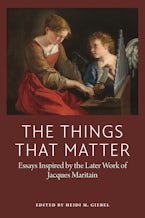- Home
- philosophy
- psychology
- Ethical Excellence
Preparing your PDF for download...
There was a problem with your download, please contact the server administrator.
Ethical Excellence
Philosophers, Psychologists, and Real-Life Exemplars Show Us How to Achieve It
Imprint: Catholic University of America Press
Why do some people achieve ethical excellence while others fail? For example, how did Gloria Lewis overcome a lifetime of difficulty and go on to found a non-profit focused on feeding the homeless while Danny Starrett, despite a seemingly ideal childhood, became a rapist and murderer? Why did some Germans rescue their Jewish neighbors while others stood by?
One recent study found that four personal variables, taken together, differentiated Nazi-era bystanders from rescuers with startling 96.1% accuracy: social responsibility, altruistic moral reasoning, empathic concern, and risk-taking—traits related to ethical excellences (virtues) like justice, benevolence, and courage. Drawing from the combined wisdom of classical Socratic and Confucian philosophy, recent work in psychology, and the lived experience of recognized moral heroes, the book focuses on how each of us can work toward ethical excellence, becoming more like Lewis and neighbor-rescuers than like Starrett and Nazi-era bystanders.
The ancient Socratic and Confucian philosophical traditions offer surprisingly sophisticated advice regarding moral education. Because research in psychology helps us assess the feasibility of cultivating virtue in ourselves and those we influence, Ethical Excellence focuses on combining sound philosophical analysis of ethical virtue and related concepts with relevant empirical research on how these concepts are manifested and developed in everyday practice. Willpower, for example, contributes to development of temperance or moderation, grit relates to perseverance, and empathy is connected to benevolence.
Finally, the study of ethically exceptional people—moral heroes or exemplars—serves as living proof that ethical excellence is possible, and exemplars can provide inspiration to attempt it ourselves and guidance regarding how to do so successfully. Relevant stories and excerpts from the author’s own interviews with award-winning ethical exemplars complement the use of philosophical virtue theory and psychological research on virtue-relevant practice. Together, these three approaches—philosophy, psychology, and biography—help to triangulate" ethical excellence and its achievement, presenting a much clearer and more complete picture than we can get from any one of these methods alone.
Heidi Giebel is professor of philosophy at the University of St. Thomas, Minnesota.
"Offers a novel approach by bringing together two wisdom traditions, contemporary psychological research on character development, and the stories of real-life exemplars in order to give helpful advice on how to become virtuous...shows what can be gained by making philosophy more personal."
~David McPherson, Creighton University
"In Ethical Excellence, Heidi Geibel succeeds brilliantly at the challenging task of weaving together ancient philosophical insight from East and West, modern psychological research, and stories from the lives of exemplary individuals. Each strand of the book expands on and reinforces the others. Confucians fill out gaps in Socratic theory and vice versa; psychologists test, tweak, and confirm ancient theories; and contemporary lives give richness and realism to the ideals. The whole tapestry, conveyed in Geibel’s lovely, accessible prose, is nothing short of a master class in how to cultivate a better, more meaningful life for oneself and all those for whom one cares."
~Stephen C. Angle, Wesleyan University
"In this wonderful book, Professor Heidi Giebel gives us a unique and compelling account of how to pursue a life of ethical excellence. Rooted in the philosophical thought found in the Socratic and Confucian traditions, empirically informed, and offering informative and inspirational stories of real-life moral exemplars, Giebel’s book will not only be of interest to scholars and students but will also be practically useful to anyone who seeks ethical excellence and who wants to help foster it in others. This is moral philosophy as it ought to be done, for the sake of cultivating virtue and human flourishing."
~Michael W. Austin, Eastern Kentucky University
"Not all that interested in becoming a better person? Read this book and you just might change your mind! Giebel weaves stories of real people together with a rich and accessible discussion of moral philosophy and psychology. The result is a wise, charming, practical, and entertaining account of what moral excellence is and how we all can move toward it. This book offers not only clarity of understanding but more fulfilled lives and deeper happiness--for ourselves and for our children, students, and fellow citizens."
~Anne Colby, author of The Power of Ideals: The Real Story of Moral Choice
" Ethical Excellence offers a novel approach by bringing together two great wisdom traditions (namely, Socratic and Confucian traditions), contemporary psychological research on character development, and the stories of real-life exemplars in order to give helpful advice on how to become more virtuous. Giebel also demonstrates what can be gained by making philosophy more personal."
~David McPherson, author of Virtue and Meaning: A Neo-Aristotelian Perspective
" Ethical Excellence is an amazing achievement. Drawing on ancient Greek and Confucian philosophy, contemporary psychology, interviews with sixteen living exemplars, and her own lived experience, Heidi Giebel takes us on a fascinating tour of the virtues and what it is to live a life of excellence. Highly recommended!"
~Christian Miller, Wake Forest University and Director of the Honesty Project


